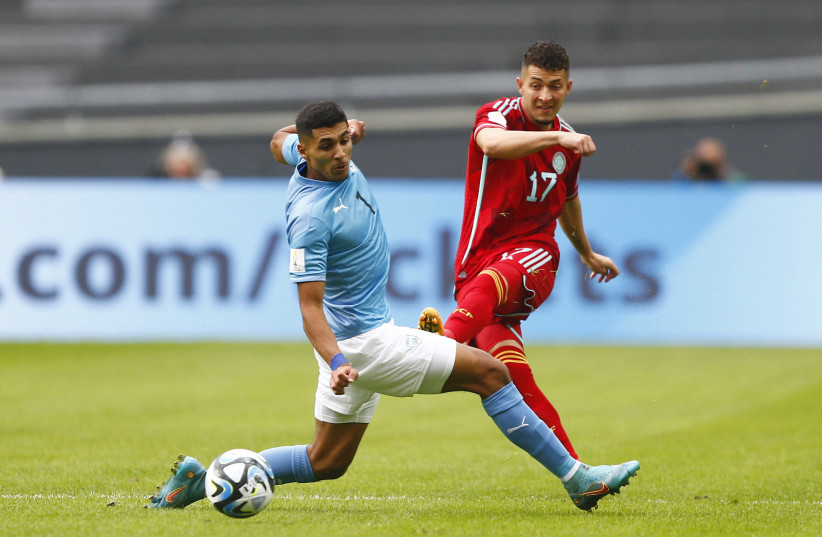What should Israel do if opponents boycott its participation at the Olympic games?
Israelis celebrated on Wednesday when the country’s opponents in this summer’s Olympics soccer competition at the Paris Games were confirmed.
Israel will face Paraguay, Mali and an Asian qualifier that is yet to be confirmed. Arab nations Morocco and Egypt, with which Israel has diplomatic ties, but with whom sporting ties have been strained over the decades, are also participating. There is a chance that Israel could face them in the later rounds of the competition. Sub-Saharan Mali, which is 95% Muslim, severed ties with Israel after the Yom Kippur War in 1973.
As the countdown for Paris 2024 gains momentum and the Gaza war drags on, could Israel’s soccer matches be boycotted?
In other sports, Israeli athletes have become used to nations such as Iran regularly refusing to turn up due to Israeli participation.
Israeli soccer has been down this road before. Israel was a member of the Asian Football Confederation (AFC) between 1954 and 1974 but because of the Arab boycott, several Arab and Muslim states refused to compete against them. The geopolitical tensions culminated in Israel “progressing” in the qualifying stages of the 1958 World Cup without playing a single match. This forced FIFA to schedule a playoff between Israel and Wales to ensure that the Israeli team faced at least one opponent. Wales won that playoff.

Israel was expelled from the AFC in 1974 and was forced to play in FIFA’s Oceania Confederation, whose opponents were on the other side of the world. It finally became a member of European soccer under UEFA in 1992.
Qualification for Paris is a historic milestone
Israel’s qualification for the Paris Olympics soccer tournament marks a historic milestone, ending a nearly five-decade absence from the Games, and rightly, this should be celebrated. However, if Israel’s ground invasion of Gaza in response to Hamas’s October 7 attacks is still ongoing later this summer, the diplomatic ramifications could be a cause for concern.
We have already seen calls for Israel to be banned from the Eurovision Song Contest, and the Olympics are a Eurovision on the biggest stage of all.
In December, Jordan’s football association called on the global sports community to take “decisive action” against Israel for its attacks in Gaza “until the occupying state complies with international ceasefire demands.” Over 300 Palestinian sports clubs and grassroots organizations have also signed a petition led by the BDS Movement demanding Israel be banned from the Olympics.
Israel’s participation at the Paris Games should not be reduced to a political litmus test and should be viewed through the lens of athletic achievement and international cooperation. The Olympics are a platform for fostering understanding and unity across borders that transcend political divides.
The specter of boycotts has already reared its head in advance of this year’s competition with the International Olympic Committee’s (IOC) ban on Russia competing as a nation due to its invasion of Ukraine.
Russia has responded by announcing a “Friendship Games” event similar to the one held in 1984 due to the Soviet-bloc’s boycott of the Los Angeles Olympics that year. Analogies between Russia’s actions in Ukraine and Israel’s in Gaza provoke contentious debates, and the prominent focus on Israel on the world stage – such as constant UN antagonism over the war and world court trials – mean Israel must tread carefully and not isolate itself.
“Israel and the IOC are on a collision course,” the US magazine The Nation, noted for its criticism of Israeli policies, warned earlier this year. “A close look at how the IOC is treating Russia provides insight into what might – or perhaps even should – happen with the state of Israel.” As the guardians of Olympic ideals, the IOC is tasked with upholding neutrality and inclusivity while confronting geopolitical realities.
Israel is unlikely to face similar repercussions from the IOC unless the war takes a significant moral turn for the worse, but it does raise complex moral and diplomatic considerations.
Israel’s participation at the Olympics was backed by IOC President Thomas Bach earlier this month and this should be celebrated, but countries could decide to boycott of their own accord. If the IOC changes its stance, however, there should be an outcry from both official government bodies and from everyone else who believes that Israel’s war against Hamas, which began with the worst massacre of Jews since the Holocaust, is warranted and just. That is when the real fight begins.





Comments are closed.